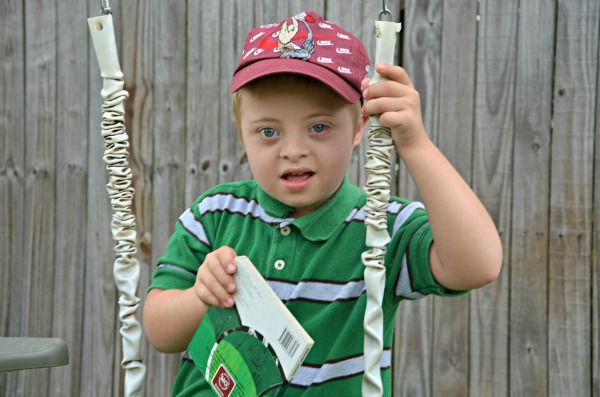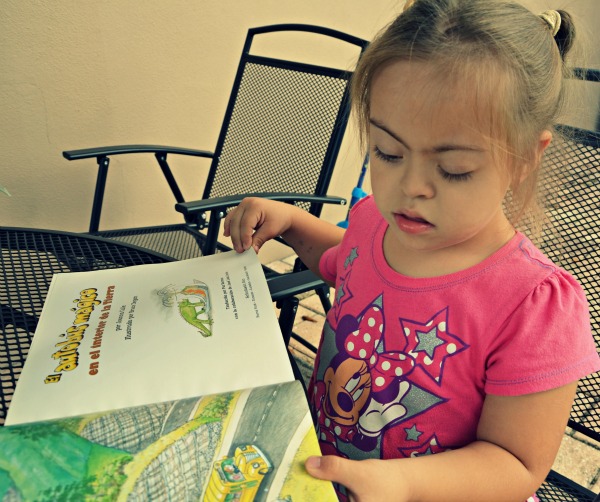
I’m raising bilingual kids with special needs. You can do it too.
When my first child was born, I was immediately warned that I shouldn’t expose a child with special needs to two languages. The reasons were that:
— Their speech development will slow down from trying to learn two languages
— Their brains don’t have the capacity to make the switch from one language to another
— They are already challenged with the disability, so I shouldn’t add an unnecessary challenge to their lives
I immigrated to this country just weeks before my first son was born. Although I had a college degree in English, I was still in the process of adjusting and improving my English when all this happened. Actually, eight years later, I’m still learning.
It’s common to hear that kids get confused when they are exposed to two languages at the same time. So just imagine how complicated it is to decide to raise children with special needs bilingually, especially when you’re surrounded by people who don’t believe in bilingualism.
Down syndrome is the most common genetic disorder in the world, but the high incidence doesn’t make it any easier to make decisions on how to educate your child and what to expect from him. Raising him bilingual was a must for me, but an impossible fantasy for the specialists.
But fantasies can come true!
I never stopped speaking in Spanish to my child. Spanish became his first language, so by the age of 1 his first words obviously came in Spanish.
His speech was evaluated at the age of 18 months and the outcome was very poor. One more time, the speech therapist reminded me of her warning to only speak English at home. I didn’t give up but she did, telling me that she didn’t have the tools or knowledge to provide therapy to a child who was being raised bilingual.
I knew I was doing the right thing and that his speech was progressing. My decision wasn’t the real problem; it was instead the lack of resources in my community. Many times we were rejected at therapy centers for not speaking English at home.
But my question was still the same: Why do I have to speak only English to my child and forfeit his right to be bilingual? Giving a child more opportunities to learn is not hurting him; it is opening his world to new challenges that will make him grow and succeed, regardless of his abilities.
School Readiness At 3-Years-Old
As with many children with special needs, my son started school at the age of three. Since the very first day, he understood and followed along in class with no problems. His teachers didn’t speak Spanish and he never had problems understanding English. That’s the time when, as a parent, you realize you are not making a mistake, and that communication is something much bigger than language.
The more you expect from your child, the more you will get from him. It’s not about pushing him to do the impossible, but empowering him to go through the natural experience of learning. For children of bilingual families, being bilingual is natural.
My second child was born when my son was almost ready to start school. She was also born with Down syndrome. At that time, I didn’t have doubts about how to raise her. I was sure she would be bilingual. In her favor, she was born in an established family with an experienced mother, so her bilingual development was outstanding since the beginning.
She learned all her words in English and Spanish. The interaction with her brother was the best stimulation and the best connection with English, as were community activities such as going to the park or library as well as the daily exposure when doing typical activities in our neighborhood. By the time she started school, her integration was smooth and easy.
Today, Emir is 8 and Ayelen is 5. Both are still in the process of learning to talk and they are doing great. They speak English, Spanish and sometimes, Spanglish. The most amazing thing is that they know exactly where to use each of them. They communicate at school only in English and at home they use both.
If you are raising a bilingual child with special needs, my best advice is:
— Take it easy and give him time to process and start showing progress
— Understand that you can’t force him to speak Spanish, as his brain will probably pick the easier word, either in English or Spanish
— The main goal is still to improve his communication, and this may be a life-long task that you have to enjoy and celebrate
— The best way to enjoy teaching bilingualism is to keep speaking, reading and interacting with your children in Spanish
Assuming the challenge of raising bilingual kids with special needs is a worthy adventure.




Wow, this blows my mind. You are doing an amazing job, and I applaud you for sticking up for your kids and following your maternal instinct. Yay for being bilingüe!
You should be proud of yourself for sticking to your maternal instincts and proving those “experts” wrong. Good for you!!
I recently visited a local Mandarin immersion school. They have an autistic student who speaks Mandarin and English fluently. I wonder how many people told them he couldn’t handle it when he started?
Exactamente, la gran clave es hablar con ellos en espanol desde que nacen. Se acostumbraran a este idioma y lo hablaran con facilidad porque lo estan practicando todo el tiempo.
Aun no entiendo como algunas madres nacidas en Latinoamerica, les hablan a sus hijos en ingles….
Raising a bilingual child without disabilities is hard I can’t only imagine with it. Consistency is key and it is not impossible.
Inspiring and fabulous! Of course they can do it! Keep on doing what you are doing! What an incredible gift you are giving your children. They have an amazing mom. Muy bien!!!
Te has propuesto romper esquemas y lo estás logrando, pero se que el camino no debe haber sido fácil. Este es otro de los retos que has superado, me alegro mucho Eliana!
Yo estoy totalmente a favor de criar con ambos idiomas, es un reto y mucho más para niños con discapacidad. Ustedes son un !Trio con Superpoderes! y han logrado mucho. Tres campeones!
Felicitaciones por la constancia. Me encanta cuando mi hijo me habla en Español y sobretodo cuando escucho mi acento en él.
Considero a nuestros ninos se les debe dar la oportunidad de aprender otros idiomas para tener mayores oportunidades en la vida y abrazar las costumbres de sus padres, lindo post!
Way to go on making your goals a reality!!!
Felicitaciones por tu gran labor como madre. No sólo porque dedicas tiempo en educarlos, sino porque no les niegas el privilegio de aprender tu idioma y el de tu familia, así no limitarás la comunicación que ellos tendrán con sus abuelos.
Woah this blog is excellent i like reading your articles. Keep up the good work! You know, many individuals are searching around for this info, you can aid them greatly.
You are wonderful, Eliana! You are showing to the entire world that special needs kids just do things at their speed and at their own time. Parents just need to support them and offer them the best environment where they grow with self confidence and lots of love.
Such a wonderful post, Eliana, and kudos to you for sticking with the Spanish! Both of my boys have autism, they are nearly seven and speaking very well in both languages–I would never have believed it early on, when their early speech evaluations were so dismal.
¡Felicidades! So glad to hear your children are progressing so well. It’s pretty amazing, and I wish no one would ever discourage parents of children with special needs from teaching them a second language.
Me encanta que los niños mantengan el idioma español es un reto constante cuando en el colegio todo lo ven en ingles, como lo dices en tu post es ser constantes Saludos querida Eliana
Saludos querida Eliana 
Mi bebe de 20 meses no tiene sindrome de down. Mi lengua materna es el espa;ol y la lengua materna de mi esposo es el ingles. Vivimos en el Reino Unido. A mi hija le hablo todo el tiempo en espa;ol y me gusta poner musica en espa;ol. Te agradeceria que nos compartieras herramientas y actividades para seguir apoyando a nuestros hijos a ser bilingues. Por lo menos yo como mama siento el deseo y la responsabilidad de ense;arle a mi hija el idioma espa;ol. Si yo no lo hago nadie mas lo hara. Gracias por tu respuesta a este mensaje.
I believe that is among the most significant info for me.
And i’m happy reading your article. But should remark on few basic issues, The web site style is great, the articles is really
excellent : D. Good activity, cheers